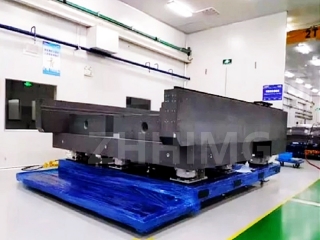First, the advantages of granite precision components
1. High hardness and wear resistance: Granite, as a natural hard stone, has extremely high hardness and wear resistance. This allows granite precision components to maintain better surface accuracy and stability during long-term use, and are not easy to be worn or scratched.
2. Low coefficient of thermal expansion: The coefficient of thermal expansion of granite is relatively small, so it can still maintain good dimensional stability in the environment with large temperature changes. This is especially important where high precision measurements are required.
3. Strong corrosion resistance: Granite has good corrosion resistance to a variety of chemical substances, and can maintain stable performance even in harsh working environments.
4. No special maintenance: Compared with metal components, granite precision components do not need special anti-corrosion and anti-rust treatment, and the maintenance cost is lower.
Second, the shortcomings of granite precision components
1. Large weight: The density of granite is higher, so the same volume of granite components are heavier than metal components. This, to some extent, limits its application in situations where lightweight design is required.
2. High processing difficulty: Due to the extremely high hardness of granite, more professional equipment and tools need to be used in the processing process, and the processing difficulty and cost are relatively high.
3. Brittleness: compared with metal, granite is brittle and prone to fracture or damage when subjected to impact or vibration.
Three, the advantages of metal components
1. Lightweight design: The density of metal components is relatively low, which can achieve lightweight design and meet the strict requirements of weight in aerospace, automotive and other fields.
2. Good electrical and thermal conductivity: metal is a good conductor of electricity and a good conductor of heat, which makes metal components have a wide range of application prospects in electronics, electricity and other fields.
3. Easy processing: The processing difficulty of metal components is relatively low, and a variety of processing methods and equipment can be used for processing, with high production efficiency.
Four, the shortcomings of metal components
1. Easy corrosion: Metal components are prone to corrosion in humid, acidic or alkaline environments, affecting service life and performance stability.
2. Large coefficient of thermal expansion: the coefficient of thermal expansion of metal is relatively large, and it is easy to change size in the environment with large temperature changes, affecting the accuracy.
3. Need special maintenance: Metal components need special treatment such as anti-corrosion and anti-rust during use, and the maintenance cost is high.
V. Conclusion
In summary, granite precision components and metal components have their own unique advantages and disadvantages. When selecting components, comprehensive consideration should be made according to specific application scenarios and requirements. For occasions requiring high precision, high stability and corrosion resistance, granite precision components are the better choice; For applications requiring lightweight design, good electrical conductivity or ease of processing, metal components may be more suitable. Through reasonable selection and application, we can give full play to the advantages of these two components and provide strong support for the development of related fields.
Post time: Jul-31-2024

